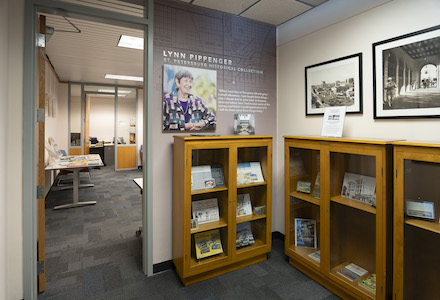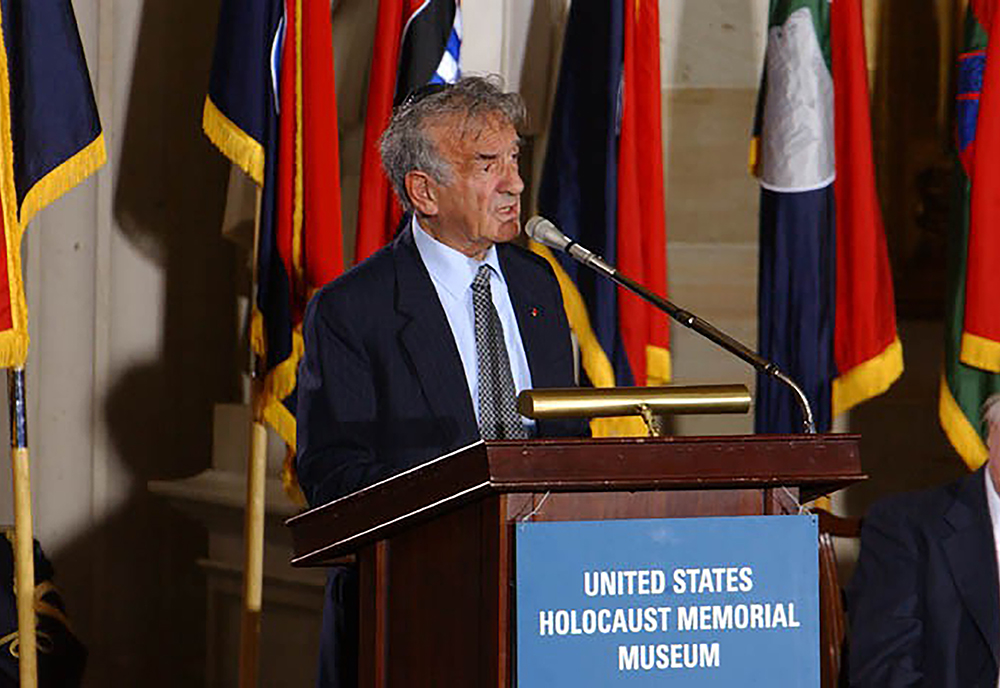The university will establish the Elie Wiesel Center for Humanitarian Ethics.
By Matthew Cimitile, University Communications and Marketing, and the Florida Holocaust Museum
The Elie Wiesel Foundation for Humanity named the University of South Florida (USF) and the Florida Holocaust Museum as the permanent home of the papers and artifacts of Elie Wiesel, a Holocaust survivor who became an esteemed humanitarian, writer and recipient of the Nobel Peace Prize.
Wiesel’s physical and digitized papers, including correspondence with world leaders, unfinished manuscripts, photographs and video and audio recordings will be housed and catalogued at the Nelson Poynter Memorial Library’s Special Collections Department on the USF St. Petersburg campus. Artifacts from his collection, including his Nobel Prize, the contents of his personal office and library, and a variety of artworks will become a cornerstone of the permanent exhibition at the museum, which is located in downtown St. Petersburg, FL.
The announcement was made at the Florida Holocaust Museum’s annual “To Life” Gala on February 3.
With this trove of historical documents and research materials, USF plans to create the Elie Wiesel Center for Humanitarian Ethics. The new center will feature an onsite historical archive. Digital access will be available through a searchable database built by Gratz College, which has the world's largest online graduate-level Holocaust and Genocide Studies Degree Program. The digital archive will feature advanced search and filter tools, high standard cybersecurity protections and a user-friendly dashboard. Together, it will allow researchers and educators to delve deeper into the Holocaust and apply Wiesel’s teachings to contemporary genocides, crimes against humanity and assaults on human rights.
“We are honored to work together with the Florida Holocaust Museum to create a hub of humanitarian activity and education worthy of such an extraordinary man,” said Rhea Law, president of the University of South Florida. “Together, we will build a center of intellectual activity that reflects Wiesel’s own life and learning. We are grateful for the trust placed in our university and stand ready to turn this vision into a reality.”

Correspondence with world leaders, unfinished manuscripts, and photographs will be some of the historical documents from Elie Wiesel to be housed and catalogued at the Nelson Poynter Memorial Library’s Special Collections Department.
“There are many throughout USF whose work touches on and overlaps with the life and teachings of Elie Wiesel,” said Thomas Smith, vice provost of academic affairs at USF St. Petersburg and a Florida Holocaust Museum board member. “We envision the center bringing together faculty from political science, philosophy, anthropology, criminology and other fields to develop major research initiatives around humanitarian ethics, bring in national grants and attract philanthropic support and talent to the university.”
At the Florida Holocaust Museum, the addition of the Wiesel Collection will add to the institution’s continued renovation and expansion. It will join a recently acquired boat used in the seaborne rescue that saved Denmark’s Jewish population, as well as a cattle car used to transport Jews to concentration camps.
“I’m excited the Florida Holocaust Museum will be home to my father’s entire archive, including a re-creation of his office, honoring his unwavering dedication to truth, humanity and remembrance,” said Elisha Wiesel, son of Elie and Marion Wiesel and chairman of the Elie Wiesel Foundation. “For almost 30 years, my father taught at Eckerd College, and he and my mother fell in love with St. Petersburg and the surrounding community, which is why I’m honored to be a part of solidifying the importance of this location to my father with the permanent exhibit of his collection.”
The collection will also be converted into an international traveling exhibition by the museum, making it available to Holocaust and genocide researchers around the world and allowing both scholars and the public unprecedented access to Mr. Wiesel’s life and work.
“This treasure trove of artifacts is a game-changer for the museum, St. Petersburg and our entire region,” said Michael Igel, board chairman of the Florida Holocaust Museum. “Like the man himself, the Wiesel Collection will be a beacon of hope and a catalyst for action. Elie Wiesel was a master at explaining to all of us why the lessons of the Holocaust matter. Now, through innovative programming and exhibitions, the museum will use his voice to ensure that his legacy will always remain relevant.”
Becoming the permanent home of the Elie Wiesel’s collection further strengthens the long partnership between USF and the Florida Holocaust Museum.
For nearly 15 years, they worked together to create the Debbie and Brent Sembler Florida Holocaust Museum Lecture Series at USF St. Petersburg, which brought speakers from around the world for talks on the Holocaust and lessons that came out of one of the darkest periods in history. Basketball legend and civil rights activist Kareem Abdul-Jabbar and Paul Rusesabagina, a manager of a resort during the Rwandan genocide whose actions were depicted in the movie “Hotel Rwanda,” were some of the notable speakers who visited the campus for the lecture series.
Very recently, the museum helped support the curriculum for a new study abroad class offered by USF, “Confronting the Holocaust.” This past summer, 18 students traveled to Poland, the Czech Republic and Germany where they explored tragic scenes at concentration and extermination camps while witnessing touching tributes and instances of humanity at museums and memorials.
The goal of the trip was to bring depth of understanding to one of the worst mass murders in human history. Housing, archiving and making accessible Elie Wiesel’s papers and establishing a center dedicated in his name is envisioned to do the same in the coming years.
"The USF Libraries look forward to ensuring these materials and the stories they represent are shared through ongoing teaching and research initiatives, securing opportunities for scholars and students to both learn and create new knowledge from Elie Wiesel’s invaluable archive,” said Kristina Keogh, dean of the Nelson Poynter Memorial Library.
